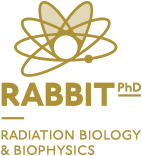Kateryna Krupa

PhD Programme: Radiation Biology and Biophysics
10519
k.krupa@campus.fct.unl.pt
Research Areas
PhD Thesis: “Study of secondary particle interactions generated by ion irradiation of biologically relevant media" (2014-2018)
Adviser: Prof. Doutor Gustavo García
Radiotherapy techniques based on proton and heavier ion (helium, carbon, oxygen) beam irradiation (hadrontherapy) have become as one of the most specific treatments for cancer tumours. Because of the properties of the energy loss patterns for ion beams, they are much more efficient than photon beams by concentrating the energy deposition around a reduced area (Bragg peak) and minimizing the dose in the surrounding health tissue. Around the Bragg peak enormous quantities of secondary particles are generated, mainly low energy electrons but also radicals (negative, positive ions and neutrals), which finally configure the radiation damage by inducing dissociations to the molecules constituting the medium. Additionally, during the slowdown process, high energy ions generate secondary positrons, via nuclear reactions, which can be used as a complement for the beam dosimetry by studying their annihilation images (PET scanner).
In this doctoral project we proposed the study of electron, positron and radical interactions with biologically relevant molecules (water, DNA bases and analogue molecular structures).
‐ Interactions will be studied in terms of cross sections derived both from theory and experiments.
‐ Cross section data will be integrating into a step by step Monte Carlo simulation code to model radiation damage in terms of induced molecular dissociations.
‐ The predictions of the model will be experimentally validated by comparing with measurements when irradiating condensed molecular targets in controlled experimental conditions



